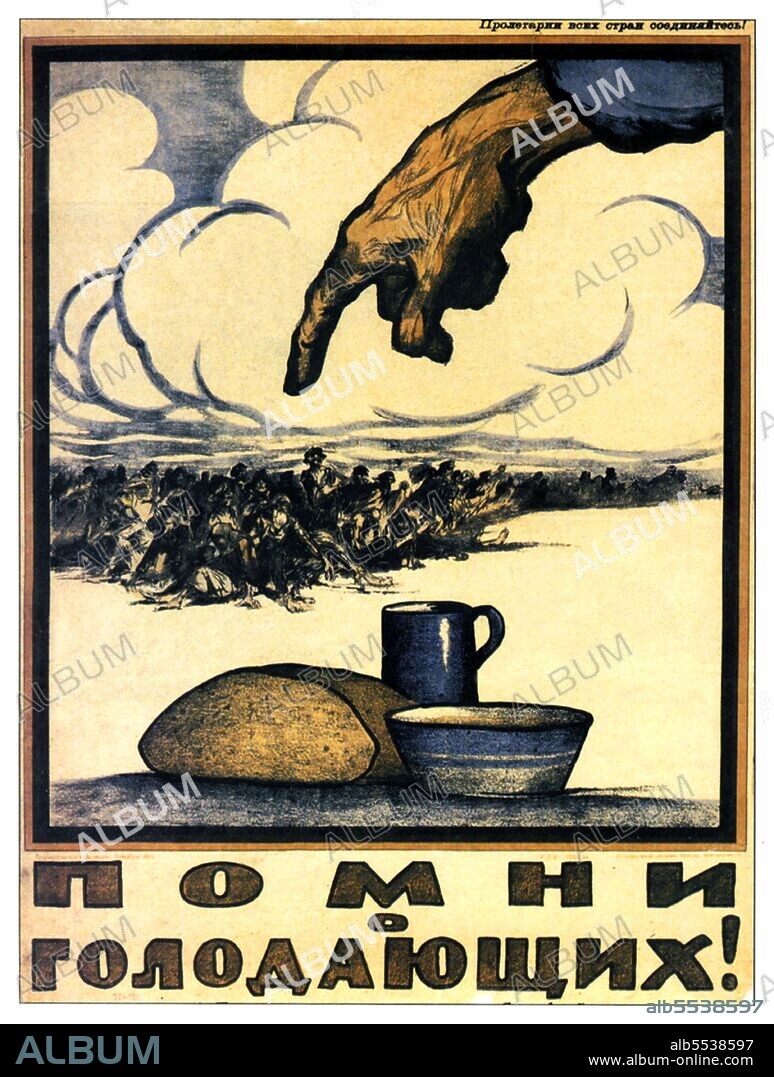alb5538597
Russia: 'Think About Those Who are Starving'. Revolutionary poster, c. 1921

|
Ajouter à une autre Lightbox |
|
Ajouter à une autre Lightbox |



Avez-vous déjà un compte? S'identifier
Vous n'avez pas de compte ? S'inscrire
Acheter cette image

Titre:
Russia: 'Think About Those Who are Starving'. Revolutionary poster, c. 1921
Légende:
Voir la traduction automatique
The Russian famine of 1921, also known as Povolzhye famine, which began in the early spring of that year and lasted through 1922, was a severe famine that occurred in Bolshevik Russia. The famine, which killed an estimated 6 million people, affected mostly the Volga and Ural River region. The famine resulted from the combined effect of economic disturbance, which had already started during World War I, and continued through the disturbances of the Russian Revolution of 1917 and Russian Civil War with its policy of War Communism, especially prodrazvyorstka, aided furthermore by rail systems that could not move food around efficiently. One of Russia's intermittent droughts that occurred in 1921 aggravated the situation to the level of the national catastrophe. Hunger was so severe that it was doubtful that seed-grain would be sown rather than eaten. At one point, relief agencies had to give grain to the railroad staff to get their supplies moved. The famine was the justification offered for the Bolsheviks' 1922 confiscation of Russian Orthodox Church property in Russia.
Crédit:
Album / Pictures From History/Universal Images Group
Autorisations:
Modèle: Non - Propriété: Non
Questions sur les droits?
Questions sur les droits?
Taille de l'image:
3700 x 4892 px | 51.8 MB
Taille d'impression:
31.3 x 41.4 cm | 12.3 x 16.3 in (300 dpi)
Mots clés:
AFFICHAGE • AFFICHE • AFFICHES • ART (CATÉGORIE) • ART • ART, PEINTURE • COMMUNISME • COMMUNISME: UNION SOVIETIQ • COMMUSIME • GRANDE GUERRE • GUERRE 14-18 • GUERRE 1914-1918 • GUERRE MONDIALE I • HISOIRE • HISTOIRE • PEINTURE • POSTER • PREMIERE GUERRE MONDIALE (1914-1918) • PREMIERE GUERRE MONDIALE • REVOLUTION • RUSSE • RUSSIE • TABLEAU • TABLEAUX
 Pinterest
Pinterest Twitter
Twitter Facebook
Facebook Copier le lien
Copier le lien Email
Email
